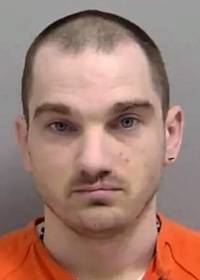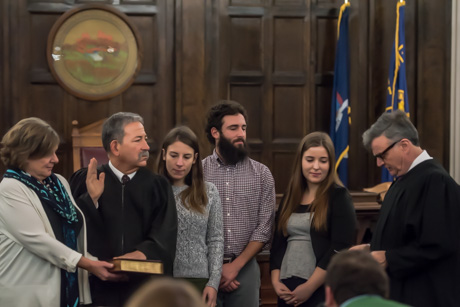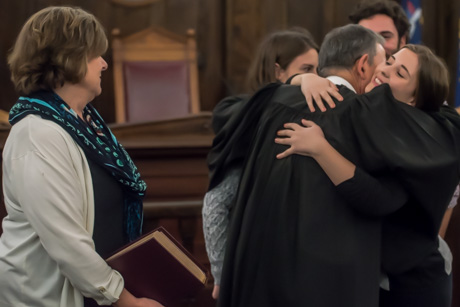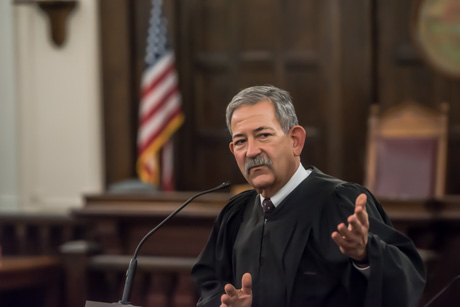Phone calls, intercepted letter, and witness testimony add new detail to Dunn trial on Day 3

Norman Dubois was sitting on his couch, watching TV in his Middleport apartment, when Edward Dunn and Katherine Henry left the property. Hours later, he knew they had returned by the frantic pounding on his door.
On the third day of testimony in the trial of Edward A. Dunn, jurors heard from witnesses as prosecutors continued to build their case using jail phone calls, intercepted mail, and personal accounts tied to the days preceding and following the death of 59-year-old Michael Poole.
One witness called on Friday was Lieutenant Christopher Caulfield, the interim jail superintendent in Orleans County. In his testimony, Caulfield authenticated two phone calls made by Dunn from the county jail, both on April 13, 2024.
Both calls were made to Katherine Henry.
“Oh my god, remember that game of hide and seek we played where I found you?” Henry asked Dunn in the second call.
“They found it?” Dunn asked.
“Yeah,” Henry responded. “I’m not comfortable on the phone.”
In addition to the phone calls, the prosecution introduced evidence in the form of a letter intercepted from Dunn to Henry. The letter was not opened until a warrant was signed to do so, and was opened by Genesee County Investigator Kevin Forsyth.
“I was informed on April 25th of 2024 that the letter was located,” Forsyth said.
He received the letter personally on April 29, still sealed.
When he opened it, he found five double-sided pages written by Dunn, with dates written sporadically throughout, indicating that the letter had been written over an extended period.
The handwritten letter included statements about wiping fingerprints from a bag and concerns about whether phone calls had implicated Dunn.
“He had indicated that, ‘I hope the phone calls didn’t f*** me,’” Forsyth recalled regarding the contents of the letter.
Forsyth also assisted Investigator Ryan DeLong in obtaining a search warrant for Poole’s cell phone to determine its location on the date of his death. RTT data from March 17, 2024, the day Poole died, placed the device traveling from the Rochester Road residence where Dunn and Henry had been staying toward areas in northern Genesee County where Poole’s body was later discovered.
Multiple witnesses placed Dunn and Henry at the Rochester Road residence in Middleport in the days before Poole’s death. Norman Dubois, who allowed Dunn and Henry to stay with him at that address, testified that when he met Dunn, Dunn was introduced as “Mike.” Dubois also testified that, although they had agreed to do so, Henry and Dunn paid no rent or other agreed-upon expenses.
Dubois testified that on March 17, Dunn and Henry left the apartment midday.
“Doing laundry or something,” was the reason Dubois gave the court for Dunn leaving.
They were gone for a couple of hours, Dubois said. He became aware of their return when he heard Henry frantically pounding on the apartment door.
“Frantic, upset, scared” was how Dubois described Henry’s demeanor when he let her inside.
The day’s testimonies concluded with Robert Mesler, the owner of Wild Rides repair shop on Ridge Road in Medina. Mesler’s then-girlfriend, Joselyn Burner, is the stepsister of the defendant, Edward Dunn.
Between 8:00 and 9:00 p.m. on March 17, 2024, Mesler recalled a car pulling into the driveway of his shop as he and his sons were inside.
“I told my two boys, I said that’s the vehicle that was involved with the laundromat robbery in Lyndonville,” Mesler said.
When he and his sons went outside, they saw Dunn outside the vehicle, looking through the windows of the repair shop.
When Mesler asked Dunn what he wanted, Dunn said he was there to speak with Burner.
“In nice words, I’ll say that I asked him to leave, that I didn’t want him there,” Mesler said.
Dunn returned to the car and got into the rear driver’s-side seat. Mesler then approached the vehicle and tapped on the window. The face revealed when the window was rolled down was that of Norman Dubois. Mesler noted that someone else was seated in the rear passenger seat. He didn’t recognize the individual, but said they appeared to be female.
Dubois then backed out of the driveway, Mesler testified, and the vehicle headed west on Ridge Road toward Niagara County.
The first witness of the day was Sgt. James Diehl, an investigator with the Sheriff's Office.
While Diehl was involved with the case on the day Poole's body was found, much of his testimony focused on a search of the residence of Dubois on March 28, 2024.
Diehl used a bed band headboard to climb into a crawl space in the attic.
He testified that after less than a minute after looking into the attic, he spotted a knife and a shell casing. He noticed that most of the insulation in the attic was covered in dust and soot, except the area within a few feet of the ceiling opening into the attic.
He also found a rifle partially concealed in the insulation, along with a baggie containing more ammunition.
The casing looked to be .22 caliber, he said.
When he inspected the rifle closer, he said he spotted what looked like fingerprints on the receiver.
He notifed fellow investigator Joseph Loftus. While he bagged the smaller evidence, he didn't have a bag large enough for the rifle.
Asked if Loftus was wearing gloves when Diehl handed the rifle to him, Diehl responded quickly, "I wouldn't have handed it to him at the time if he wasn't (wearing gloves)."
Diehl was responsible for logging the evidence, tagging it, and storing it, and eventually transferring it to the crime lab in Monroe County.
During cross-examination, he described the rifle as "break action," meaning it opens where the barrel and receiver meet for loading. It was a single-shot rifle, he said, meaning it had to be opened and loaded for each shot it fired.
Howard Owens contributed to this story.




